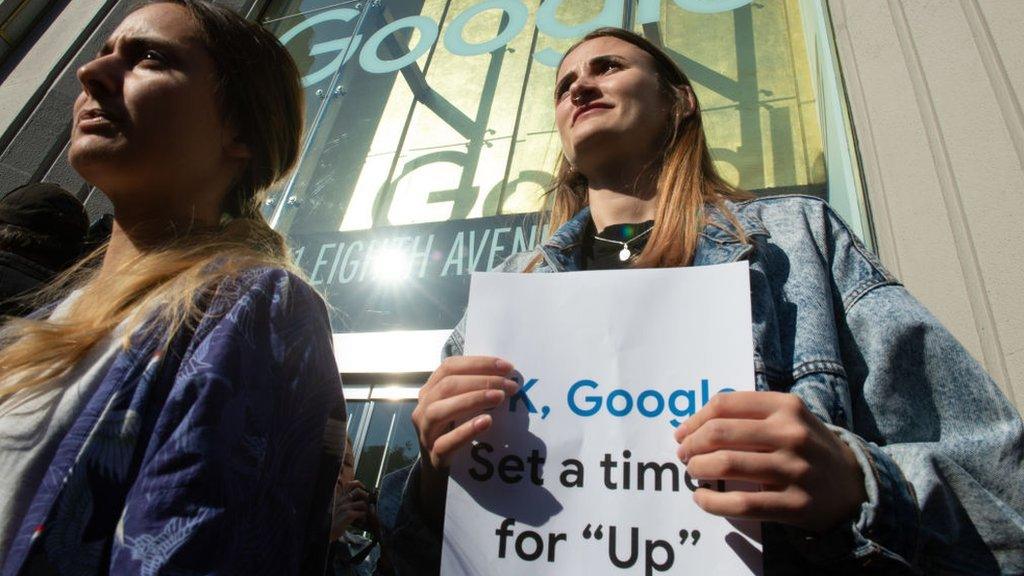Ex-Google boss defends multiple controversies
- Published

Eric Schmidt is to leave Alphabet's board in June
Former Google boss Eric Schmidt has defended the company’s record on multiple controversies: its work in China, its treatment of women, and its tax affairs.
The 64-year-old executive, who sits on the board at Google’s parent company, Alphabet, said the tech giant was right to pursue opportunities in China, despite heavy criticism from senior US officials.
"The world is a very interconnected place,” Mr Schmidt told BBC Newsnight’s Emily Maitlis.
"There are many, many benefits interacting, among other things, with China.”
General Joseph Dunford, who as chairman of the US joint chiefs of staff is the highest ranking American in uniform, said Google’s work "indirectly benefits the Chinese military and creates a challenge for us in maintaining a competitive advantage".
Mr Schmidt dismissed the concern.
"That's like saying America makes pencils and pencils are used by the Chinese.”
Chinese ambition
Google has had a tumultuous history in China. It left the country in 2010 over concerns it was being by censored and cyber-attacked by Beijing, and instead set up an operation in Hong Kong.
Mr Schmidt said he disagreed with that move.
“I believed they would be better to stay in China, and help change China to be more open.”
More recently, the company has been building a presence in the country once again, with an estimated 700 employees now working on advertising and other development. In 2017, it established the Google AI China Center, in Shanghai.
Google exploring 'censored' China search app
Leaks chip away at Google's secrecy on China
Last year, reporting from The Intercept and New York Times revealed Google had been working on a project named Dragonfly, a search engine that would reportedly fall in line with Beijing’s requirements.
It was highly controversial, and prompted high-profile resignations, and a letter of protest signed by 1,400 Google employees.
The company has since said it was no longer working on the project.
When asked why most Google employees only learned of Dragonfly via media reports, Mr Schmidt said he had no direct involvement in the project, but that “I can tell you that certainly the people who were building all these products knew about it”.
Employee discontent
Mr Schmidt ran Google as chief executive and chairman from 2001 to 2011, then executive chairman until 2015. He then became executive chairman of Alphabet, the company set up as Google’s parent.
In that time, the Google's motto transitioned from, famously, “Don’t be evil” into “do the right thing”. Over the past 12 months, employee discontent has challenged that notion both internally and externally. Last November, staff at Google offices globally staged a walk-out over issues surrounding gender equality at the firm.
The protest took place after a New York Times investigation discovered Google had quietly paid former executive Andy Rubin $90m in severance, despite there being a credible claim of sexual harassment made against him.
Mr Schmidt told Newsnight the firm’s employees protested because they felt empowered.
“Transparency is a virtue,” Mr Schmidt said.
"And the fact of the matter is that if we had tried to suppress this stuff it would have come out anyway. It's much better to encourage people to express their opinions.

"We would argue that [the protests show] our culture at work. Google is famously empowering of its employees and we want to hear from them. These are cases where the employees collectively felt very strongly about the decisions that the company had made.”
A follow-up protest took place last month after organisers of November’s walk-out claimed they were being punished for their activism.
"My manager started ignoring me,” wrote Clare Stapleton, a Google employee in New York, in an internal memo obtained by Wired magazine, external. “My work was given to other people, and I was told to go on medical leave, even though I’m not sick.”
Tax complaint
Mr Schmidt stepped down as Alphabet’s chairman in 2017, but remained on the board. Last month, he said he would be leaving the firm altogether in June.
Throughout his tenure, the tax affairs of Google - like other tech giants - have been under close scrutiny. The company has always maintained that it adheres to the tax laws in all of the countries that it operates in.
Documents filed in the Netherlands showed Google moved 19.9 billion euros (£17.9bn, $22.7bn) to a shell company in Bermuda, a tax haven. Mr Schmidt told the BBC he was happy the company’s tax affairs were ethical.
“We are required to follow the tax rules, and the tax rules allow that,” he said.
"When those tax rules change of course we will adopt them. But there is a presumption that somehow we're doing something wrong here. We’re following the global tax regime.”
He added: “Would you like us to give more, voluntarily, to these governments?
“I will defend the company and the way it works for a very long time."